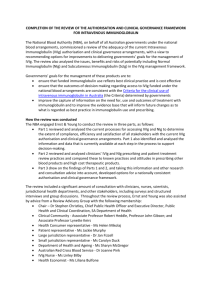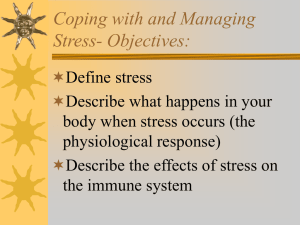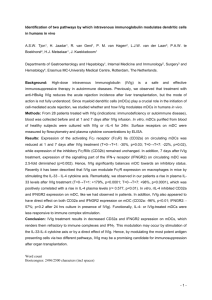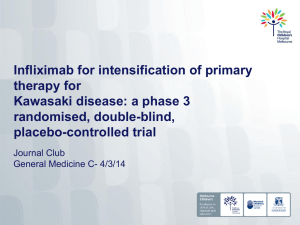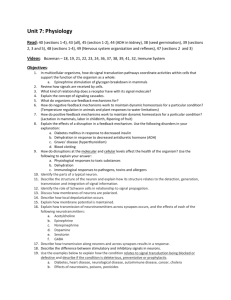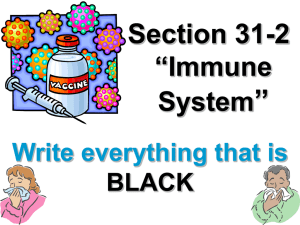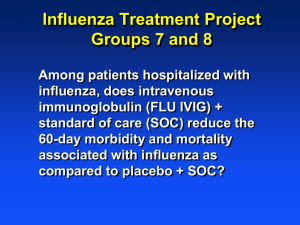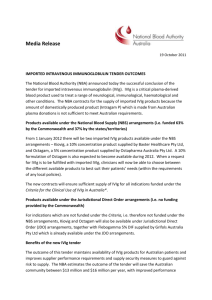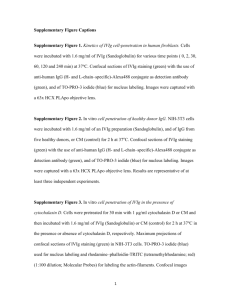INTRAVENOUS IMMUNOGLOBULIN THERAPY AN IMMUNE
advertisement
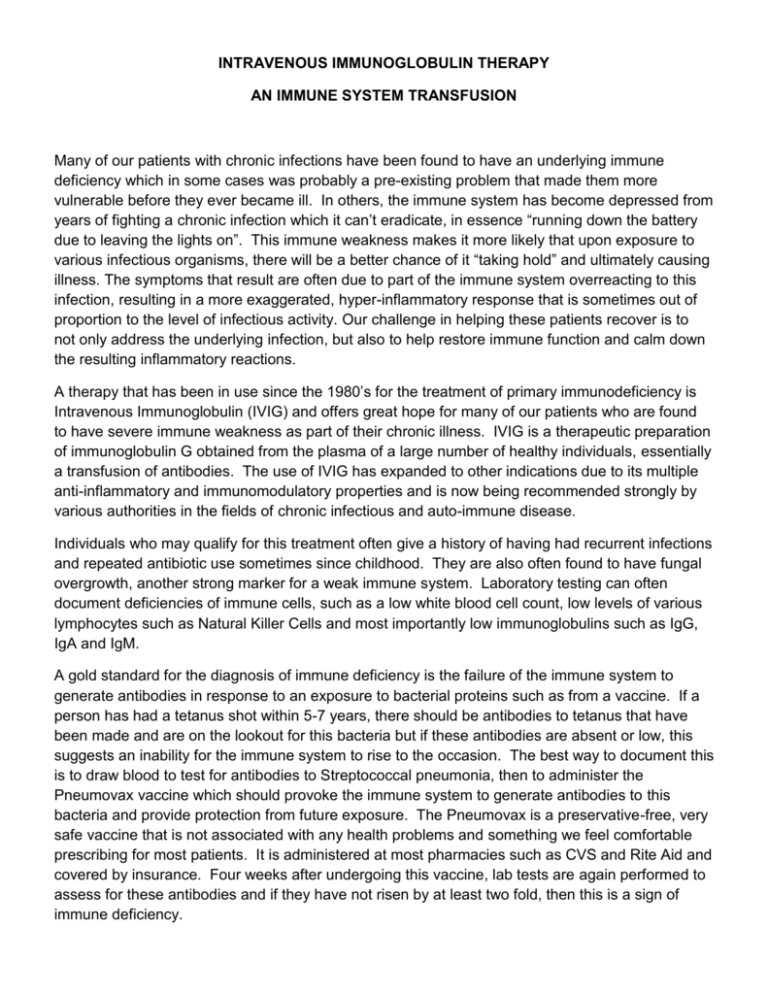
INTRAVENOUS IMMUNOGLOBULIN THERAPY AN IMMUNE SYSTEM TRANSFUSION Many of our patients with chronic infections have been found to have an underlying immune deficiency which in some cases was probably a pre-existing problem that made them more vulnerable before they ever became ill. In others, the immune system has become depressed from years of fighting a chronic infection which it can’t eradicate, in essence “running down the battery due to leaving the lights on”. This immune weakness makes it more likely that upon exposure to various infectious organisms, there will be a better chance of it “taking hold” and ultimately causing illness. The symptoms that result are often due to part of the immune system overreacting to this infection, resulting in a more exaggerated, hyper-inflammatory response that is sometimes out of proportion to the level of infectious activity. Our challenge in helping these patients recover is to not only address the underlying infection, but also to help restore immune function and calm down the resulting inflammatory reactions. A therapy that has been in use since the 1980’s for the treatment of primary immunodeficiency is Intravenous Immunoglobulin (IVIG) and offers great hope for many of our patients who are found to have severe immune weakness as part of their chronic illness. IVIG is a therapeutic preparation of immunoglobulin G obtained from the plasma of a large number of healthy individuals, essentially a transfusion of antibodies. The use of IVIG has expanded to other indications due to its multiple anti-inflammatory and immunomodulatory properties and is now being recommended strongly by various authorities in the fields of chronic infectious and auto-immune disease. Individuals who may qualify for this treatment often give a history of having had recurrent infections and repeated antibiotic use sometimes since childhood. They are also often found to have fungal overgrowth, another strong marker for a weak immune system. Laboratory testing can often document deficiencies of immune cells, such as a low white blood cell count, low levels of various lymphocytes such as Natural Killer Cells and most importantly low immunoglobulins such as IgG, IgA and IgM. A gold standard for the diagnosis of immune deficiency is the failure of the immune system to generate antibodies in response to an exposure to bacterial proteins such as from a vaccine. If a person has had a tetanus shot within 5-7 years, there should be antibodies to tetanus that have been made and are on the lookout for this bacteria but if these antibodies are absent or low, this suggests an inability for the immune system to rise to the occasion. The best way to document this is to draw blood to test for antibodies to Streptococcal pneumonia, then to administer the Pneumovax vaccine which should provoke the immune system to generate antibodies to this bacteria and provide protection from future exposure. The Pneumovax is a preservative-free, very safe vaccine that is not associated with any health problems and something we feel comfortable prescribing for most patients. It is administered at most pharmacies such as CVS and Rite Aid and covered by insurance. Four weeks after undergoing this vaccine, lab tests are again performed to assess for these antibodies and if they have not risen by at least two fold, then this is a sign of immune deficiency. IVIG not only can be effective in restoring levels of immune cells, it also helps to raise platelet levels in conditions where they have fallen significantly and the patient is at risk of excessive bleeding and bruising. While not that common, this is a condition we see surprisingly often in patients with chronic infections, especially tick-borne organisms such as Bartonella. IVIG can restore platelet counts and improve immunity so that these patients have a much better chance of recovery. Another indication for the use if IVIG is neuropathy, a common finding in many patients with chronic infections but it can be present in other situations such as diabetes. Neuropathy usually affects the extremities and can cause symptoms such as chronic pain, numbness and tingling or a feeling of being cold. Sometimes medications such as Lyrica, Neurontin, Cymbalta and Lamictal can help but if neuropathy is documented by certainly studies, then IVIG can be approved and provide extremely good results in terms of reversal of this condition. To make this diagnosis, patients typically will undergo an electromyography (EMG), a procedure to assess electrical flow in sensory nerves and/or a skin biopsy to assess the health of the small nerve fibers that send sensory signals. If these tests are abnormal, IVIG is indicated. IVIG is also indicated in the treatment of certain severe inflammatory conditions that affect the muscles and skin. Polymyositis is a condition of rapid muscle degeneration that can lead to paralysis and can be documented by elevation of an enzyme released from muscle breakdown. This can happen all over the body or in just one limb and so far, no one really understands the cause of this mysterious condition. Dermatomyositis is a similar condition in which degeneration also affects the skin. Both of these conditions are effectively treated by IVIG. While IVIG offers extraordinary promise for many patients with chronic illness, it is a very expensive treatment and is not practical for most without insurance coverage. It is easily covered when specific documentation is obtained, being pre-approved so that treatment can actually be performed in our office with us being able to file for the infusion procedure while the pharmacy will be able to file for the treatment itself. Based on each patient’s condition, the lab tests and procedures noted above will be used to obtain information that can helpful in obtaining preauthorization. Once approved, the IV infusion will be scheduled to be performed in our office with the infusion time ranging from 3 to 6 hours. IVIG is typically given on a monthly basis with the length of treatment being difficult to determine as that will depend on the specific reason the treatment is being used and the individual circumstances of each patient. For some conditions, 612 months of therapy may allow them to wean off therapy and remain stable while for others, treatment may need to remain ongoing. While intravenously administered immunoglobulin therapy has been the standard ways the treatment has been given, an alternate method is available which is subcutaneous immunoglobulin (SCIg). This is an easier method of infusion for those with poor veins as well as for children, although it is not possible to provide as high a dose as when given intravenously. Even with this lower dose, therapeutic benefits can often be observed and provide some insight as to the potential benefit of further therapy. This product is available at no cost for the first month so for those who can’t get insurance to cover IVIG, this offers a way to try to therapy to determine if benefits may be obtained. SCIg is much less expensive than IVIG so some patients can afford to continue this therapy by paying for it directly.
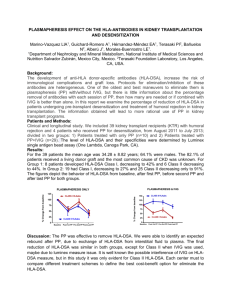
![Immune Sys Quiz[1] - kyoussef-mci](http://s3.studylib.net/store/data/006621981_1-02033c62cab9330a6e1312a8f53a74c4-300x300.png)

